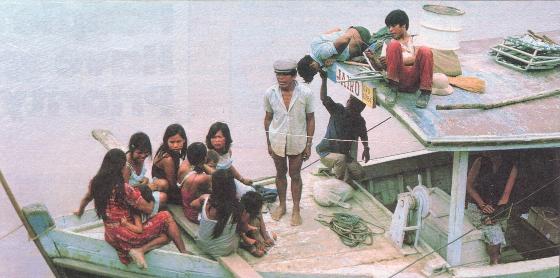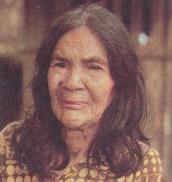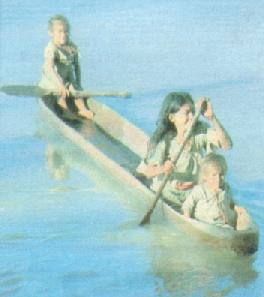The Think-About-God-Thing
by Ken Prettol
From “In Other Words,” October/November 1985
What should I do with this vise-grip wrench? I wondered. My wife and I were packing to leave our Ese Ejja (ESS-ey EY-ha) village home. It was time to take the Ese Ejja New Testament to the city for its final revision and checking before printing. But the stack of things to take had grown too large. We’d never fit it all into the tiny airplane.
As I pulled the wrench out of the pile, Arturo came to mind. He’d always borrowed it and was quite adept at using it for repairing his boat motor. I was sure he’d want it. I knew I could sell it to him cheap, but another idea came to mind.
Arturo was an Ese Ejja, intelligent and resourceful when it comes to fixing things. I’d seen him many times get his motor running again with just a screwdriver and that wrench.
Unfortunately, Arturo was not interested in the Gospel. He was opposed to anything even slightly Christian. Many times Arturo had stood outside the door of our house when we’d have an evening social, afraid we might turn it into a “church service.”
Maybe this will do something for Arturo, I thought, and walked to his house. As I approached, I saw him lounging on a wobbly bench outside, joking with his brother-in-law.
“Arturo,” I began, “I’d like you to have my wrench. It’s a free gift but I’d like it to be a ‘think-about-God-thing.’ Whenever you use it, I hope you’ll remember to think about God.”
In Ese Ejja we have a handy way of constructing just such complex words, and I saw Arturo smile as he accepted the wrench. He’d gotten the message. “It’s good,” he said--the closest thing to “thank you” in Ese Ejja.
Later that day, in the bustle of leaving and saying good-bye to all our friends, I hardly had time to think of Arturo. But in the following months I prayed for him--prayed that the seed I had planted would grow and he would begin to think about God.
Months later, when the New Testament was finished and ready for the dedication, we returned to the village, anxious to see our friends and participate in the excitement of the presentation. As we visited from house to house and spent time talking with our co-workers, we heard good reports of the many Ese Ejjas who were eagerly awaiting the completed book.
But most thrilling of all was to hear that Arturo had been thinking about God. In fact, Arturo had labored many long hours over a set of bows and arrows to trade as payment for his New Testament. He was actually the first one to buy a New Testament. He had been “thinking about God”, he assured me when I visted with him.
During the following months we heard that Arturo had gone up to Peru to visit the Ese Ejja village where his parents lived. Ese Ejjas often went to that area to communicate with the evil spirits since demon worship was actively practiced there. What a disappointment, we thought. Arturo’s returned to that! Later that year our co-workers, Jack and Nola Shoemaker, and two Ese Ejja pastors made a New Testament distribution trip up to the Peruvian Ese Ejja villages. They found good interest in the New Testament and the meetings were well attended. At the end of one meeting the pastors gave an invitation for anyone who wanted to follow God’s way to come forward and demonstrate publicly their desire to turn from Satan to God.
Two men stood up and came to the bench. One was Arturo, clutching his New Testament. He was the first to make his stand for the Lord in front of his family and all of those who later might taunt him and try to turn him away. Arturo wanted no secrets--he had decided to follow the Lord.
God’s Word was making an impact. Did that wrench, the think-about-God-thing, have anything to do with it? I don’t know for sure, but I do know that God asks us to be faithful. As Paul says in I Corinthians 3:6, “I planted the seed, Apollos watered it, but God made it grow.”

The boat, Jairo, took Ese Ejja New Testaments and literacy materials to every village on the river, an 800-mile round trip. |
Back to Top
A White Robe for Asha
by Joyce Prettol
From “In Other Words,” March 1986
I was worried as I sat down at my hand-hewn desk to prepare the lesson for the Bible study. Who would minister to these Ese Ejja women when we were gone? Sure, they’d have the New Testament in their language, but so far they hadn’t learned to share it with others.
I also worried about Asha. An old, old lady, Asha had suffered from polio in her youth and had remained partially crippled. She was a second wife who had never had any children. Others in the village ridiculed her.
Now she was very sick from an abdominal tumor. Many times my co-worker Nola and I had talked to her about the Lord and her need to trust in Him, but we never seemed to get anywhere. Either she couldn’t comprehend or didn’t care to listen. Was it disinterest or some other factor that kept her from paying attention to the message of love?
Well, I thought, I wouldn’t solve the problems by worrying. I committed the situation to God in prayer and turned to the lesson. We were studying Revelation, the last Scripture portion to be published before the New Testament was completed. I looked forward to hearing the ladies’ responses to the promises in chapter seven.
As the ladies began to gather for the study, Nola and I were pleased to see Shajjapiso step into the coolness of the leaf-roofed house. The elderly lady had hiked a long way to attend, but even though she was tired the sparkle in her eyes told me she was glad to be there.
Long ago, Shajjapiso had told us, she’d seen a vision of an angel in the sky. She’d clung to the promise that God would someday send another messenger. When translation began on the New Testament, she knew this was what she had waited for. She accepted Christ as her Savior and encouraged her sons to follow.
As Nola and I presented the lesson that day, we were surprised when the ladies latched on to verse 9. “We’ll all have white clothes when we get to heaven!” they exclaimed.
Of all the promises, those white robes really impressed them! As we continued to discuss the lesson, we mentioned that it was only those who had received Jesus as Savior who would go to heaven and receive a white robe.
“But what about Asha?” we asked. “Will she have a white robe? Will she be happy and have a full tummy?”
Each one agreed. “No, Asha doesn’t know Jesus.”
“Who will tell her then?” I asked. “Nola and I have tried, but she doesn’t seem to listen. Will you ladies go talk to her? Maybe she will listen to you!”
“Yes,” they agreed. “Lets all go and share this with her today.”
We filed over to Asha’s house, stooped and entered the low, dark room. Our eyes slowly became accustomed to the darkness and we could see Asha lying curled up on a thin woven mat. A tattered, stained blanket covered her thin body and her faded dress hadn’t been washed in a long time.
If anyone needs a new white robe, Asha does, I thought. Oh God, let this be the day of salvation for Asha.
Shajjapiso sat on the edge of the group but Nola put her right up in front and encouraged her. “Tell her, Shajjapiso. Tell her about God and how He loves us and has many good things for us waiting in heaven.”
Shajjapiso sat on the ground next to Asha and haltingly began to share with her. Several other ladies chimed in with “Yes, it’s true” and “We read it in God’s Word.”
Then slowly, Asha hunched up on her knees and stared at Shajjapiso. In her eyes was a hunger and a spark we had never seen before. She wanted to know more. Perhaps all the good things promised in heaven didn’t touch her as much as someone showing love. Someone was willing to say “I care, and I want you to know this happy news.”
As I watched the Ese Ejja women sitting there, holding hands, touching, caring and reaching out to God in prayer with Asha, my heart began to swell. I knew it was time to let go of them. God would show them how to share His Word in an infinitely better way than I ever could. “Lord,” I prayed silently, “teach them to love each other, to minister to each other.”
Asha died only a few weeks later. But her transformation was apparent. Many of the ladies who before had gossiped about her took time to visit with her and read Scripture and sing to her. Later, the ladies also went and witnessed to the other older women in the village--bringing many of them to a saving knowledge of Jesus Christ.

Under Shajjapiso’s leadership, the Ese Ejja women learned to serve others. |

|
|
The Ese Ejja are skilled boatmen. |
|